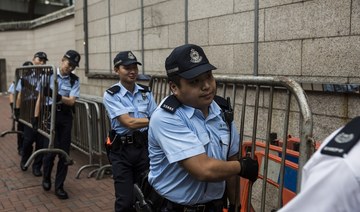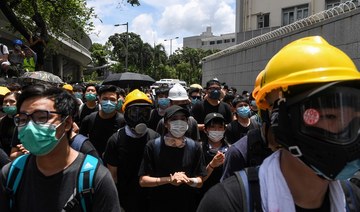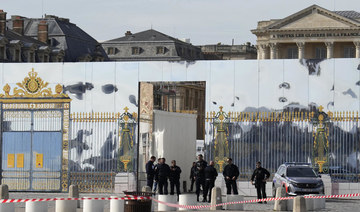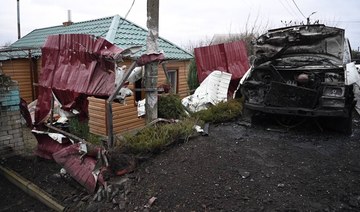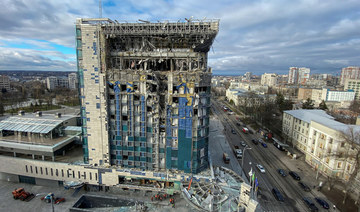HONG KONG: China promised that for 50 years after Britain gave up control of its last colony, this shimmering financial enclave would get to keep freedoms absent in the communist-ruled mainland. Twenty-two years on, those are rights many here believe Hong Kong cannot live without.
The hundreds of thousands who marched in a June 16 protest over a now-shelved extradition bill, and those still demonstrating, are signaling alarm that Hong Kong may become just another Chinese city as those protections unravel and Beijing’s influence expands in the territory.
Activists are planning more protests for Wednesday, hoping to win attention and support from world leaders gathering in Osaka, Japan, for the Group of 20 summit later this week.
“This is not about a power struggle,” said Bonnie Leung, a leader of the Civil Human Rights Front, one of a number of groups involved in organizing recent protests over the legislation. “This is about the values that make the world a better place.”
“The whole world, whoever has connections with Hong Kong, would be stakeholders,” she said.
All of those involved — the territory’s top official, Chief Executive Carrie Lam, the police, lawmakers, the protesters and the rest of Hong Kong — are caught up in tensions stemming from the “one country, two systems” colonial legacy that bequeathed a Western-style civic society under a political system controlled by Beijing.
The protests erupted after Beijing-backed Lam tried to push through legislation that would have allowed some criminal suspects to be sent to face trial in Communist Party-dominated courts in mainland China. Many in Hong Kong viewed the bill as another step toward curbing protections they expect from their legal system.
While they come from all walks of life, the protesters share a determination to preserve those freedoms, said Samson Yuen, a professor at Hong Kong’s Lingnan University.
“This protest has drawn everybody in town together,” he said. “They really value the freedom to speak up and protest.”
Jerome A. Cohen, a leading expert on Chinese law and government, said the extradition bill would have deprived local authorities of the right to prevent forcible transfers by China of suspects, including visitors, “for detention, trial and punishment that violate international standards of justice.”
The bill also would have enabled China to require Hong Kong authorities to freeze and confiscate assets of alleged suspects, Cohen wrote in a recent blog post. Efforts to limit the cases subject to extradition would not prevent suspects from being subject to China’s “incommunicado torture chambers, its denial of competent legal defenders and its unfair trials.”
Most Hong Kong residents belong to families that fled poverty and political upheavals in the communist mainland. British rule did not bequeath them democracy, but it laid the foundations for strong civic institutions, schools, health care — as well as a laissez faire trading regime dominated by business leaders deeply invested in keeping Hong Kong as it is.
Normally reluctant to wade into political matters or criticize Beijing, businesses also expressed concern over the extradition bill, with the Hong Kong General Chamber of Commerce noting that the protests reflected “serious apprehensions.” The chamber welcomed the government’s decision to suspend the bill, as did its American and British counterparts.
It’s unclear if the turnout for another big protest planned for the July 1 anniversary of Hong Kong’s 1997 handover to Chinese control might match the earlier ones.
Lam’s push for the now stalled legislation, ill-timed around the 30th anniversary of the June 4, 1989, crackdown on pro-democracy protests in Beijing’s Tiananmen Square, and the tear gas, steel batons and other aggressive tactics used by police, especially in June 12 protests that turned violent, helped draw people young and old into the streets.
Activists want an investigation into the complaints over police violence, along with Lam’s resignation and other demands. But the continued protests reflect a deeper sense of grievance and unease, especially among Hong Kong residents coming of age in an era of declining economic opportunity, said Ken Courtis, chairman of Starfort Investment Holdings.
“Social mobility is more and more theoretical in Hong Kong, so young people continue to be very dissatisfied. There’s a broader concern about China in Hong Kong. The economy’s not growing like people thought it would grow,” Courtis said.
In many respects, Hong Kong faces the same sorts of challenges of other developed economies with aging populations and slowing growth.
The city of 7 million has an economy that is bigger than Vietnam’s and a per capita GDP of more than $46,000. But controls on land use favor property developers, and half the apartments available rent for $2,550 a month or more, while median monthly incomes are about $2,300.
In a city dominated by business leaders and other elites, the only leverage protesters can wield is “the power of numbers,” said Yuen, noting that surveys of those participating in protests in recent weeks generally identify with the city’s “grassroots or lower classes.”
“They see themselves as lower class because of crony capitalism in Hong Kong. It’s very hard for them to get a fine paying job and also to buy an apartment in Hong Kong,” he said.
Brian Chow, one of the protesters sitting in the sweltering heat on a recent day outside the city’s Legislative Council building, said he wasn’t the “type” to get involved in violence.
“I’ll just carry on sitting here, sing some Christian hymns, show our resistance, keep the government paralyzed until it responds to us,” he said.
After protesters blocked lines in the tax and immigration offices downtown on Monday, the government issued a statement appealing to them to “act peacefully and rationally when expressing their opinions and not to affect those in need of government services.”
In her apologies over the extradition bill fiasco, Lam appealed for “another chance” and said she would focus on improving the economy and resolving the housing crisis.
Chinese officials warned against “outside interference” but made a point of backing Lam’s decision to sideline the proposal. At a time of severe trade friction with the US, Beijing’s higher priority lies in preserving Hong Kong’s status as a financial hub and free port, Courtis said.
“People in Beijing are pragmatic. They see time in terms of many years,” he said. “Step sideways here, if that’s not enough then step backwards. Now you focus on making the economy work and keeping people happy.”
Hong Kong protests signal alarm special freedoms fading
Hong Kong protests signal alarm special freedoms fading
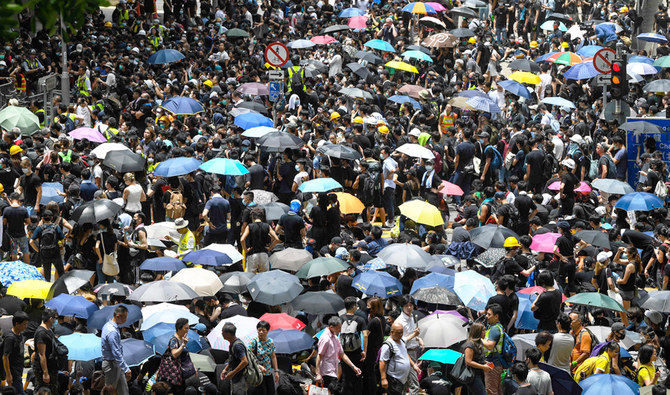
- Activists are planning more protests, hoping to win attention and support
- hundreds of thousands marched in a June 16 protest
Man arrested after Denmark’s Billund Airport evacuated over bomb threat

- Investigations into the incident are continuing, the police said
COPENHAGEN: A man was arrested in Denmark on Saturday in connection with a bomb threat at Billund Airport, the country’s second largest aviation hub, police said in a statement.
The airport, in central western Denmark, was evacuated and remains shut following the threat.
“The evacuation has proceeded calmly and as expected, with travelers following our instructions,” police inspector Michael Weiss said in a statement.
Investigations into the incident are continuing, the police said, adding it was not clear when the airport would reopen.
Indonesia on highest alert as Sulawesi volcano continues to erupt

- Over 7,500 people living near the volcano have so far been evacuated
- Volcanic activity is common in Indonesia, which lies on the Pacific ‘Ring of Fire’
JAKARTA: Indonesian authorities were on the highest alert on Saturday as a volcano in North Sulawesi continued to erupt. Thousands living nearby have been forced to leave their homes.
Mount Ruang, located on the northern side of Sulawesi Island, had at least eight eruptions since April 16, including a major one on Wednesday evening, which prompted Indonesia’s volcanology agency to issue its highest alert, which indicates an active eruption.
The center recorded at least two eruptions on Saturday, with the crater emitting white-gray smoke more than 1,200 meters above its peak after midnight, followed by another eruption at noon that released an ash column of about 250 meters.
“Based on visual observations, as of April 20, 2024, at 12:15 p.m., there is still high volcanic activity in Mt. Ruang,” Muhammad Wafid, head of the geology department at the Ministry of Energy and Mineral Resources, said in a statement.
“The potential danger is an explosive eruption that may cause the mountain to spew volcanic rocks in different directions, followed by clouds, as well as effusive eruption, or lava flow.”
With authorities having established a six-kilometer exclusion zone around the volcano, around 7,500 people have so far been evacuated, including more than 1,500 residents who live on the smaller island where Mount Ruang stands, and around 6,000 people living on neighboring Tagulandang island, northeast of the volcano, according to the latest data from Indonesia’s National Disaster Mitigation Agency. Thousands more are still at risk.
The international airport in Manado city, less than 100 kilometers away from Mount Ruang, is closed until at least Sunday because of volcanic ash.
“There are still concerns, because tremors and volcanic earthquakes are still being recorded by our devices, indicating magmatic fluid supply is still moving from the depth to the surface,” Hendra Gunawan, who heads Indonesia’s volcanology agency, told Arab News.
“There’s still potential for more eruptions … And a tsunami may occur if there is a large flow of volcanic material into the sea.”
Indonesia, a vast archipelago nation, has around 120 active volcanoes. The country experiences frequent seismic and volcanic activity due to its location on the arc of volcanoes and fault lines in the Pacific Basin known as the “Ring of Fire.”
Moscow says 50 Ukrainian drones shot down as attacks spark fires at Russian power stations
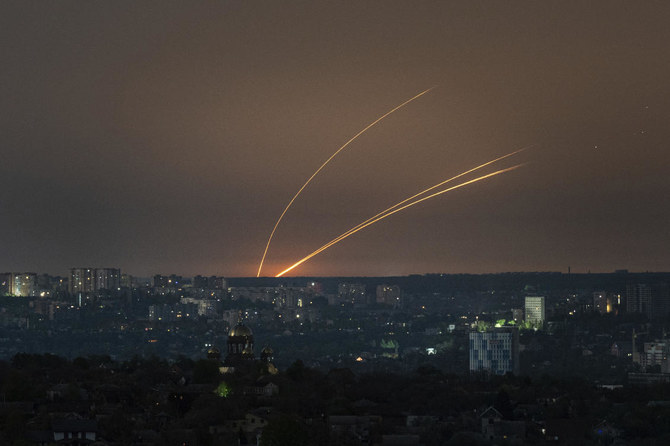
- Fifty drones were shot down by air defenses over eight Russian regions, including 26 over the country’s western Belgorod region
- Russia’s Defense Ministry said that it had shot down a Ukrainian Sukhoi Su-25 fighter jet
KYIV: Ukraine launched a barrage of drones across Russia overnight, the Defense Ministry in Moscow said Saturday, in attacks that appeared to target the country’s energy infrastructure.
Fifty drones were shot down by air defenses over eight Russian regions, including 26 over the country’s western Belgorod region close to the Ukrainian border. Two people — a woman with a broken leg and the man caring for her — died during the overnight barrage, after explosions sparked a blaze that set their home alight, Belgorod Gov. Vyacheslav Gladkov wrote on social media. A pregnant woman and her unborn child were also killed in shelling later Saturday, he said.
Drones were also reportedly destroyed over the Bryansk, Kursk, Tula, Smolensk, Ryazan, Kaluga regions across Russia’s west and south, as well as in the Moscow region.
Russia’s Defense Ministry said that it had shot down a Ukrainian Sukhoi Su-25 fighter jet. It provided no details and the claims could not be independently verified.
Ukrainian officials normally decline to comment about attacks on Russian soil. However, many of the drone strikes appeared to be directed toward Russia’s energy infrastructure.
The head of the Kaluga region, Vladislav Shapsha, said Saturday that a drone strike had sparked a blaze at an electrical substation, while Bryansk Gov. Alexander Bogomaz and Smolensk Gov. Vasily Anokhin also reported fires at fuel and energy complexes.
In recent months, Russian refineries and oil terminals have become priority targets of Ukrainian drone attacks, part of stepped-up assaults on Russian territory.
Ukrainian drone developers have been extending the weapons’ range for months, as Kyiv attempts to compensate for its battlefield disadvantage in weapons and troops. The unmanned aerial vehicles are also an affordable option while Ukraine waits for more US military aid.
Moscow also said Friday evening that an American citizen known to have fought with Kremlin-backed separatists in Ukraine between 2014 and 2017 had died in the Russian-occupied Donetsk region.
Russell Bentley, 64, was no longer involved in military operations and previously worked for state-owned Russian news agency Sputnik. His death was confirmed by his former battalion and by Margarita Simonyan, head of the state-funded television channel RT, who described him as “a real American.” He used the call-sign “Texas” and had spent time in prison on charges of drug smuggling before leaving the United States.
No information has been released as to the cause of Bentley’s death, but local police had previously reported the American as missing on April 8.
Meanwhile, Russia attacked Ukraine overnight with seven missiles, and air defenses downed two missiles and three reconnaissance drones, the Ukrainian air force said Saturday.
Gov. Oleh Kiper, head of Ukraine’s Odesa region, said that ballistic missiles had damaged infrastructure overnight, but did not provide further details. Previous attacks on the Black Sea city on Friday damaged port infrastructure, including two food export terminals, Ukrainian President Volodymyr Zelensky said.
Russian shelling also killed two men, including an 81-year-old pensioner in the city of Vovchansk, said Gov. Oleh Syniehubov, head of Ukraine’s Kharkiv region.
A 60-year-old woman was also injured after shelling struck a nine-story apartment block, he said.
Efforts underway to bring home Filipinos killed in UAE floods
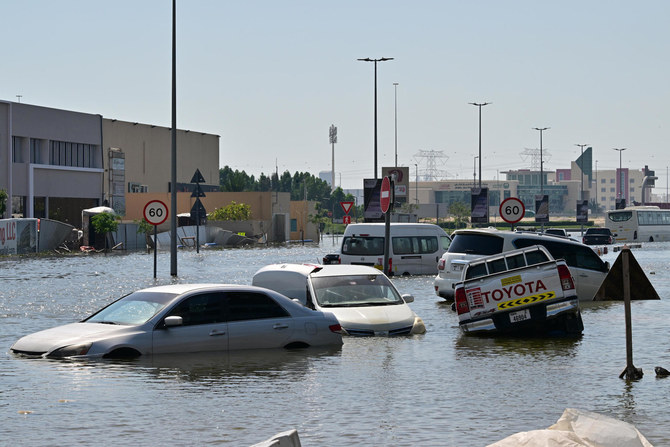
- At least three Filipinos lost their lives in the unprecedented flooding
- Philippine consulate received assistance requests from at least 100 Filipinos
Manila: The Philippine government is assisting Filipinos affected by the record-high rains and flooding that hit the UAE this week, authorities said on Saturday, as it works to repatriate the nationals who lost their lives.
A strong storm first hit Oman last weekend, killing at least 20 people, before it pounded the UAE on Tuesday, marking the heaviest rains in 75 years and bringing the Gulf state to a standstill.
The Philippine Department of Migrant Workers has confirmed the deaths of at least three Filipinos who died in road accidents as their vehicles were submerged in floodwaters.
Philippine Consul General Marford Angeles told Arab News the consulate had received assistance requests from at least 100 Filipinos — some working in the UAE, some studying, and some transiting via Dubai.
“Over 1 million Filipino nationals are currently residing in the UAE ... Majority of assistance requests received by the consulate so far originate from the populous emirates of Dubai and Sharjah, reflecting the concentration of Filipino residents in these areas,” he said.
“The unprecedented weather conditions in the UAE affected most residents.”
The three Filipinos who lost their lives in the floods were two women who died inside their flooded vehicle, and a man who died after sustaining major injuries when his vehicle fell into a sinkhole. His two passengers have been hospitalized.
“The Department of Migrant Workers, through its Migrant Workers Offices in Dubai and Abu Dhabi, is working with local authorities for the repatriation of the remains of three overseas Filipino workers (OFWs) who died during the severe flooding,” the DMW said in a statement.
“Two other OFWs, both male, suffered injuries from the vehicular accident that happened in the sinkhole. They are recuperating from their injuries.”
US House to vote on long-awaited $95 billion Ukraine, Israel aid package

- Some hard-line Republicans have voiced strong opposition to further Ukraine aid
WASHINGTON: The Republican-controlled US House of Representatives on Saturday is set to vote on, and expected to pass, a $95 billion legislative package providing security assistance to Ukraine, Israel and Taiwan, over bitter objections from party hard-liners.
More than two months have passed since the Democratic-majority Senate passed a similar measure and US leaders from Democratic President Joe Biden to top Senate Republican Mitch McConnell have been urging embattled House Speaker Mike Johnson to bring it up for a vote.
Johnson this week chose to ignore ouster threats by hard-line members of his fractious 218-213 majority and push forward the measure that includes some $60.84 billion for Ukraine as it struggles to fight off a two-year Russian invasion.
The unusual four-bill package also includes funds for Israel, security assistance for Taiwan and allies in the Indo-Pacific and a measure that includes sanctions, a threat to ban the Chinese-owned social media app TikTok and the potential transfer of seized Russian assets to Ukraine.
“The world is watching what the Congress does,” the White House said in a statement on Friday. “Passing this legislation would send a powerful message about the strength of American leadership at a pivotal moment. The Administration urges both chambers of the Congress to quickly send this supplemental funding package to the President’s desk.”
A bipartisan 316-94 House majority on Friday voted to advance the bill to a vote, and Senate Majority Leader Chuck Schumer told senators to be ready to work over the weekend if it passes the House as expected.
“It’s not the perfect legislation, it’s not the legislation that we would write if Republicans were in charge of both the House, the Senate, and the White House,” Johnson told reporters on Friday. “This is the best possible product that we can get under these circumstances to take care of these really important obligations.”
Some hard-line Republicans have voiced strong opposition to further Ukraine aid, with some arguing the US can ill afford it given its rising $34 trillion national debt. They have repeatedly raised the threat of ousting Johnson, who became speaker in October after his predecessor, Kevin McCarthy, was ousted by party hard-liners.
Representative Bob Good, chair of the hard-line House Freedom Caucus, told reporters on Friday that the bills represent a “slide down into the abyss of greater fiscal crisis and America-last policies that reflect Biden and Schumer and (House Democratic leader Hakeem) Jeffries, and don’t reflect the American people.”
But Republican presidential candidate Donald Trump, who carries huge influence in the party, on April 12 voiced support for Johnson and in a Thursday social media post said Ukraine’s survival is important for the US
The bills provide $60.84 billion to address the conflict in Ukraine, including $23 billion to replenish US weapons, stocks and facilities; $26 billion for Israel, including $9.1 billion for humanitarian needs, and $8.12 billion for the Indo-Pacific.



